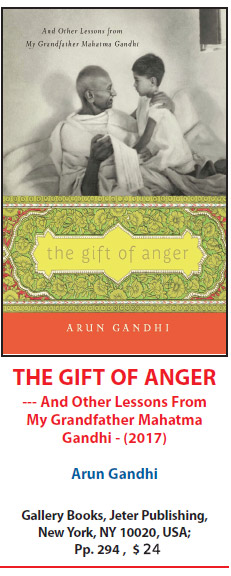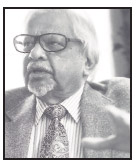Anger management, as
Gandhiji saw it
M.R. Dua
Let's first ponder over
the title of this book:
can the 'anger' be
termed as a gift? Yes,
says the author. But,
he doesn't go very far
in telling us what he means by
calling 'anger' a gift. The author,
Arun Gandhi, grandson of the
Mahatma, father of the Indian
Nation, quotes Bapuji: "We should
not be ashamed of anger. It's a
The author quotes his
grandfather: "Use your
anger for good. Anger to
people is like gas to the
automobile – it fuels you
to move forward and get
to a better place.
Without it, we would not
be motivated to rise to a
challenge. It is an
energy that compels us
to define what is just
and unjust." And that,
the author infers, is a
'gift' for us.
 very good and a powerful thing
that motivates us. But what we
need to be ashamed of is the way
we abuse it."
very good and a powerful thing
that motivates us. But what we
need to be ashamed of is the way
we abuse it."
When barely 12-year-old, Arun
came from South Africa to live in Gandhiji's Sevagram ashram in
Wardha, in Maharastra, and
stayed there with his grandfather
for over two years.
Though Arun came to the
ashram 'as an angry young boy
having difficulty expressing his
emotions… during the two years
he lived under his grandfather's
wing, he learned to harness his
anger and see it as a 'gift' to
motivate him and help him bring
about good in the universe.'
In this tiny-sized volume's
short 11 chapters, Arun narrates
personal experiences, and
entwines these with grandfather's
short spans that he spent in South
Africa and India. In almost all
chapters, Arun recounts his
grandfather's those historic
events and incidents that initially
created anger, but when sorted
out peacefully, led to establishing
significant doctrines that 'strike a
universal chord' about selfdiscovery,
identity, depression
and anger, loneliness, and family
deemed vital for tumultuous life
in modern times.
The author quotes his
grandfather: "Use your anger for
good. Anger to people is like gas
to the automobile – it fuels you to
move forward and get to a better
place. Without it, we would not be
motivated to rise to a challenge. It
is an energy that compels us to
define what is just and unjust."
And that, the author infers, is a
'gift' for us.
In fact, in his own book, 'My
Experiments with Truth,'
Gandhiji has at length
enumerated several incidents of his life that birthed his own anger,
but as he had tactfully handled
these, that transformed him into
a 'great man'.
 Arun Gandhi
Arun recounts some of these in
this book: For instance, though
Bapu carried a first class ticket, he
was thrown out of a rail
compartment; or, while going to
meet the British King in the
Buckingham Palace in a loincloth.
Arun Gandhi
Arun recounts some of these in
this book: For instance, though
Bapu carried a first class ticket, he
was thrown out of a rail
compartment; or, while going to
meet the British King in the
Buckingham Palace in a loincloth.
Arun refers to Mahatma's
reaction: 'Use your anger wisely.
Let it help you find solutions of
love and truth.' And that's why
'Bapu never lost temper,' and it
helped him to find amiable
solutions to knotty imbroglios.
In fact, chapter headings of
Arun's book sum up how anger
can be deemed a 'gift', e.g., 'use
anger for good'; 'you will be
tested', etc. These chapter titles,
says the author, relate to
Gandhiji's 'life as a golden thread
of stories and lessons that
continue to weave in and out
through the generations.'
Most of the book's content is
born of the author's intimate
interactions and association with
Bapu on different occasions when
the struggle for India's freedom
was at its zenith.Arun has strung
these trivial happenings in such
mesmerizing style that reader's
interest stays sturdily until the
end. However, at the same time,
In the last four chapters,
Arun Gandhi touches
peripheral issues and
controversies emerging
after Gandhiji's murder in
Delhi's Birla House. While
'anger' envelopes him and
the family, he counsels
peace and love for
humanity; befittingly
recalling his grandfather's
message of treating 'anger'
as 'gift' and abhorring
'thought of revenge' against
Gandhiji's assassin that
sheathed him and the entire
Gandhi clan.
one wonders how did Arun
recapture all these so lovingly,
(lively) and distinctly several years
after Gandhi's passing away—
unless he had noted these down?
Reminiscing Jawaharlal Nehru's
affection, respect and shoulderto-
shoulder association in the
freedom movement with Gandhiji,
Arun contextulizes his personal
respect for Nehru's 'moving
speech' the day Bapu was
assassinated, and even during
long period in later days. Arun
also talks about his own career as
a reporter in a newspaper where
he worked for 30 years.
Candidly, the author dwells
upon the not-so-illustrious legacy
of his famous grandfather's
family…Gandhiji's four sons,
Harilal (who converted to
Islam),Manilal (author Arun's
father), Devadas and Ramdas
'who tried hard to emulate Bapuji
and follow his instincts'. But he
was profusely 'hurt' as he sadly
found them totally lacking in
spirit, will and determination, and
finally gave up.
In the last four chapters, Arun
Gandhi touches peripheral issues
and controversies emerging after
Gandhiji's murder in Delhi's Birla
House. While 'anger' envelopes
him and the family, he counsels
peace and love for humanity;
befittingly recalling his
grandfather's message of treating
'anger' as 'gift' and abhorring
'thought of revenge' against
Gandhiji's assassin that sheathed
him and the entire Gandhi clan.
Ingenuously edited, the book's
wordage could be easily reduced
to half its present size. However,
Arun Gandhi is able to draw the
attention of Gandhiji's audience
to Bapu's vital personal effects
that made a tremendous impact
on his life and career.





 Arun Gandhi
Arun Gandhi